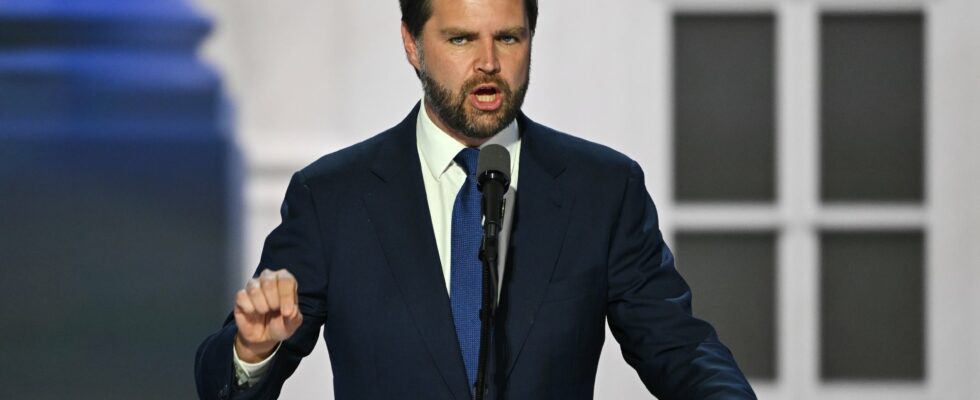“I have to be honest with you: I don’t really care what happens to Ukraine.” The intervention date February 2022just days before the start of the Russian invasion. On the microphone of Steve Bannon’s show, former adviser to Donald Trump: JD Vance. At the time aged 37, he is a rising star of American conservatism since his bestseller Hillbilly Elegya story that mixes autobiography and sociological analysis on the America of the neglected white working class. The Republican Party understood this well, and saw in him a certain political future. And Donald Trump himself propelled him as a candidate to become senator of Ohio; an election that he would win in January 2023.
Two years later, it was this same JD Vance who was chosen by Donald Trump to become his running mate and therefore his possible future vice-president if he were to win on November 5. An ideological choice, in line with the Trumpist vision of the United States and the world: “America first”.
One issue clearly places him in the same vein as the former US president: extreme isolationism and a desire to disengage from the Russian-Ukrainian conflict. And it is an understatement to say that this choice risks causing great concern in kyiv. “It is a disaster for Ukraine,” a senior European Union official told the newspaper. Politico this Monday, July 15. “Ukraine is in danger,” a European diplomat adds in the Wall Street Journal.
Opposition to US aid for kyiv
Throughout his interventions in the Senate and in the American media, JD Vance has maintained a clear course: American financial and military support for Ukraine is not intended to last forever. He was notably one of the main Republican figures to oppose the renewal of the aid package of more than 60 billion dollars for Kiev, blocked for nearly six months in the American Congress. “Even according to the most optimistic forecasts for the next presidential administration, every day we supply Ukraine is another day we sink into the hole,” he wrote last April in a memo to Republican elected officials in Congress and the Senate, reported by the geopolitical review The Great Continent.
In a column published in the newspaper The New York Times In April, J.D. Vance had reinforced his position. “The problem in Ukraine is not the Republican Party, but mathematics. Ukraine needs more troops than it can deploy, even with draconian conscription policies. And it needs more equipment than the United States can provide. This reality must guide any future policy toward Ukraine, whether it is aid from Congress or the diplomatic path chosen by the president,” he wrote.
Peace… but at what price for Ukraine?
Beyond this question of the extent of American support, Donald Trump’s new running mate has a very clear vision of the future of the conflict between kyiv and Moscow. Like the Republican candidate, who promised to resolve the war in Ukraine “in twenty-four hours” if he were in power, JD Vance makes no secret of the fact that the peace solution for Ukraine can only come through clear concessions to Russia.
“This war will end the same way almost all others do: when people negotiate and each side gives up something it doesn’t want to give up. […] “No one can explain to me how this war can end without territorial concessions compared to the 1991 borders,” he explained to the NBC in December 2023.
The subtext: Ukraine should not only definitively say goodbye to Crimea, but also to the territories conquered by Russia since 2022, be they the self-proclaimed Donetsk and Lugansk People’s Republics, or the territories in the Donetsk, Kherson, Lugansk or Zaporizhzhia regions. Russia’s criteria for possible peace talks, in short.
A position repeated in April in the New York Timeswhere JD Vance claimed that the Biden administration had “no viable plan for the Ukrainians to win this war.” “The sooner Americans face this truth, the sooner we can fix this mess and negotiate peace,” he said.
A former American soldier who served in the Marine Corps from 2003 to 2007, and a veteran of the Iraq War, JD Vance does not hesitate to use his personal history to justify the vision of foreign affairs promoted by Donald Trump. Namely: 1/ The United States no longer has the vocation to be the world’s policeman, even if it means abandoning Ukraine. 2/ The main threat to the United States is China, not Russia. 3/ Europeans must take charge of their own defense, and no longer rely solely on NATO.
On this last point, JD Vance was quite clear during his major speech at the Republican convention this Wednesday, pledging to ensure “that our allies share the burden of maintaining peace in the world”. A barely disguised dig at European countries – accused by the ex-president’s camp of not contributing enough to the financing of NATO – and which sets the tone for the future foreign policy of the United States, in the event of a Donald Trump victory.
